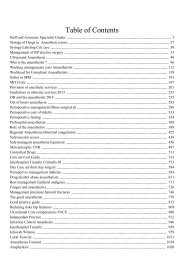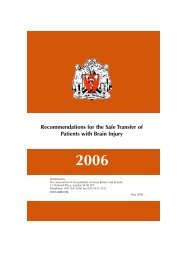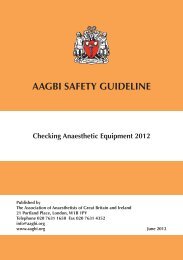TheatrePracticeStandardsGeneric1
Create successful ePaper yourself
Turn your PDF publications into a flip-book with our unique Google optimized e-Paper software.
3. Special Guidelines for Different Religious Faiths<br />
• Buddhism<br />
o A request may be made for a Buddhist priest to be informed as soon as possible<br />
after the patient’s death. This may be done by relatives<br />
o A Buddhist may refuse analgesia due to the belief that it could cloud his/her<br />
thoughts and stop meditation prior to death.<br />
o The body should not be moved for at least one hour as it is likely prayers will be<br />
said.<br />
o There are no customary rituals for laying out the body so normal last offices are<br />
appropriate.<br />
• Christianity<br />
o Last Offices may be requested. Further advice may be sought from the family priest<br />
or the hospital chaplain. There may be a request for a rosary or crucifix to be placed<br />
appropriately on the body.<br />
• Chinese<br />
o It is essential that perioperative staff contact the family as soon as possible after<br />
death in order to ensure any specific requests or wishes of the deceased and/or<br />
family are adhered to if practical.<br />
• Hinduism<br />
o It is important that the body of a Hindu patient is always covered following death.<br />
o The family usually remain with the deceased and the eldest son should be present.<br />
Relatives, of the same sex as the deceased, wash the body. Nursing staff may do<br />
this if the family requests.<br />
o Post mortems are considered disrespectful to the deceased and the family may<br />
need support in coming to terms with the legality of this issue.<br />
• Islam (Muslim)<br />
o Death is considered inevitable and relatives may take comfort from praying and<br />
reciting the Qur’an. When obvious that the patient is dying, they should be<br />
supported to lay on their right side in order to face Kaaba or Mecca, for direction of<br />
prayer. If this is not possible, every effort should be made to place the patient on<br />
their back with their feet facing towards Kaaba, with head slightly raised. The body<br />
must remain covered at all times.<br />
• Jehovah’s Witnesses<br />
o It is essential that perioperative staff contact the family as soon as possible after<br />
death in order to ensure any specific requests or wishes of the deceased and/or<br />
family are adhered to if practical.<br />
• Judaism<br />
o Perioperative staff must contact the family Rabbi/local Hebrew burial society, as<br />
soon as possible after death in order to ensure any specific requests or wishes of<br />
the deceased and/or family are adhered to if practical. Perioperative staff must not<br />
wash the body of the deceased as this is part of the rites performed. Staff may close<br />
the eyes and mouth, straighten the body and bandage the jaw. A plain white sheet<br />
may be placed over the body.<br />
o The body must not be moved at Sabbath (Friday sunset – Saturday sunset) or on<br />
festivals including: Rosh Hashanah, Yom Kippur, Succoth or Shavuot<br />
53





